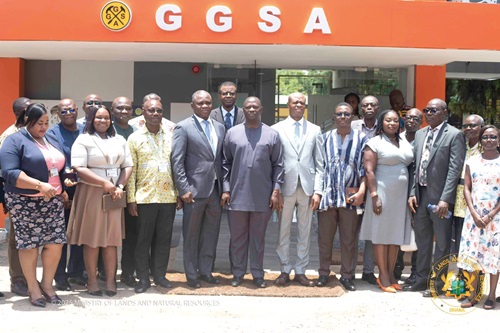The Minister of Lands and Natural Resources, Emmanuel Armah-Kofi Buah, has urged the Ghana Geological Survey Authority (GGSA) to adopt commercially viable business operation models to wean itself off government subvention.
Mr Buah observed that as a strategic institution that provided essential services for the sustainable management of the country’s mineral resources, it was worrying that the GGSA had not leveraged its unique mandate for more revenue generation and still relied on the government for funding.
He said as part of the government’s Resetting Ghana agenda, he would work closely with management of the GGSA to explore innovative funding sources to make the authority a viable revenue generator for the country.
“There is no reason why an organisation like GGSA should constantly struggle with funding.
We would have to collectively take steps to improve your financial standing because the services you provide must translate into revenue,” he said.
The Ellembelle Member of Parliament (MP) stated this last Thursday during his maiden official visit to the GGSA after taking office as the Lands and Natural Resources Minister three months ago.
The minister’s delegation included the Deputy Minister of Lands and Natural Resources, Alhaji Yusif Sulemana; the Advisor on Mines to the Minister, Prof. Jerry Samuel Yaw Kuma; and other technical staff of the ministry.
Context
The GGSA was started in 1913 as the Gold Coast Geological Survey Department with the mandate to study the country in detail to assess its resource potential.
Over the past century, the authority, apart from mineral exploration activities, has played a crucial role in the construction of the Akosombo, Kpong and Bui hydroelectric dams as well as the Tema Motorway.
In 2016, it was given an authority status as one of the agencies under the Ministry of Lands and Natural Resources in accordance with the Ghana Geological Service Act, 2016 (Act 928), to advise, promote and conduct research on geoscientific issues concerning mineral resources, groundwater, environment, geo-hazards and land use planning to support sustainable economic development in the country.
Act 928 further empowers the GGSA to conduct site or foundation investigations and issue certified reports before major construction works or projects that potentially impact the environment's subsurface structure, socio-economic, culture and aesthetics.
Paradigm shift
The minister said it was unacceptable that an institution clothed with the authority to provide such critical services for national development was virtually struggling to keep its head above water in terms of funding.
He also said situations where core technical staff and experts left the GGSA because of poor remuneration would have to be dealt with as a matter of necessity.
Mr Buah described the GGSA as one of the most important institutions under the Lands and Natural Resources Ministry, for which reason he would take every step possible to put the authority on winning ways.
He added that while efforts would be made to improve the conditions of the workers at GGSA, they must also work hard and align their operations with the government’s reset agenda.
“Everyone here must work towards achieving the government’s reset agenda for the GGSA. If we all fulfil our responsibilities, we will move in the right direction together,” he said.
Key initiatives
The Director-General of GGSA, Isaac Kuuwan Mwinbelle, made a presentation to the minister on the status of the GGSA, outlining key projects such as limestone investigation in te North-East Region; clay Investigation in the Eastern and Central regions; preparation and update of district mineral occurrence maps in the Ashanti Region; earthquake monitoring and geo-hazards assessment, as well as seismic sensitisation and education.
Highlighting the authority’s strategic targets for this year, he said the primary focus was to develop a 10-year strategic plan to serve as a roadmap for sustainable geological resource management in line with the government’s vision.
Mr Mwinbelle said the GGSA was also targeting the operationalisation of Act 928 to strengthen the authority’s regulatory framework.
The other things he touched on as targets for the year were the upgrading of the National Seismic Network into advanced data transmission systems and the publishing of technical geological bulletins meant to enhance knowledge dissemination.
He said those initiatives reflected GGSA’s commitment to bolstering its capabilities to support the country’s development.

